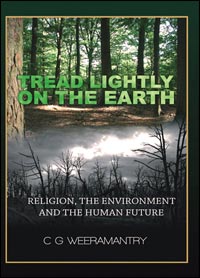A matured outlook on mother nature
'Tread Lightly on the Earth' by Justice Christopher
Weeramantry:
The question that kept chiseling into my mind when writing this
review was whether I could do justice to its contents so that another
reader would realise the magnificence of this manuscript by the erudite
author. It certainly is no novel, more a treasure trove of brilliantly
researched information that has been documented together to address one
of the most pressing needs of mankind today, saving the environment.
 The
logic and reasoning of the book are extracted from the ancient wisdoms
of the five main religions of the world, Hinduism, Judaism, Buddhism,
Christianity and Islam; revelations that have been available to us since
the introduction of these great philosophies which we human beings have
wantonly failed to recognise. What is unpardonable is how we have chosen
to ignore the primordial teachings that could have deterred or stopped
our collective efforts to annihilate the beauty of nature. The
logic and reasoning of the book are extracted from the ancient wisdoms
of the five main religions of the world, Hinduism, Judaism, Buddhism,
Christianity and Islam; revelations that have been available to us since
the introduction of these great philosophies which we human beings have
wantonly failed to recognise. What is unpardonable is how we have chosen
to ignore the primordial teachings that could have deterred or stopped
our collective efforts to annihilate the beauty of nature.
The book is all about what we can learn on the international
environmental ethic from the five main religions.
The unity that prevails among the diversity of faiths and their
points of confluence in addressing the needs for a sustainable lifestyle
is the argument. "Ancient wisdom in religions perceived the need for
ecological vision long before the problem became an active issue in the
modern world" states Justice Weeramantry.
The author skillfully moves from the past to the modern era and
quotes from the Babylonian Talmud with the same ease that he brings in
the wisdom of the Dalai Lama.
He refers to Hindu texts from Kautilya's Arthasastra (321 BC) on
rulers appointing custodians of nature and then iterates the sh'mitah
from the much older Exodus, explaining the need for the earth to rest
and not to be ploughed every 7th year. The Dhammapada and its simplicity
of teaching environmental protection is shown to be consonant with
Islam's attitude towards developing science and respect for nature. From
the first page to the last the book spells out the duties for future
generations, "to begin near to go far" in protection of the environment.
I doubt that a reader of this book influenced by Justice Weeramantry's
thinking would ever unnecessarily break a branch or pick an axe and
unjustifiably chop a tree. I wouldn't.
"The earth provides enough to satisfy everyman's need, but not
everyman's greed," Mahatma Gandhi is quoted. In the words of
Radhakrishnan it is said "we help to secure the future only to the
extent that we ourselves change." Missionary Mahinda's message to
Devanampiyatissa "O King, you maybe the ruler of this country but you
are not the owner of this land," defines the custodianship sovereigns
are required to respect. Of greater significance are the parallels the
author draws between religions and religious teachings that elucidate
clearly an individual's responsibility to safeguard what he was blessed
with to enjoy as an inheritor of the earth and then leave these
blessings intact for his children and their children.
"Nature cannot be destroyed without mankind ultimately destroying
itself," quotes the author. He reflects on how in Hinduism the Morning
Prayer includes asking forgiveness from mother-earth for treading on
her. "He raised it up and set the balance - transgress not the balance"
is derived from Qur'anic verse.
Justice Weeramantry extracts from the book of Revelations "the time
has come for destroying those who destroyed the earth." The author
quotes from the Ramayana and the Mahabharata, how Prince Rama and Prince
Arjuna refused the use of hyper destructive weapons which would destroy
entire populations. "Purpose of war is to defeat the enemy and live in
peace with him thereafter, not to destroy him," quotes Justice
Weeramantry.
Then he explains Judaic tradition too, referring to Deuteronomy and
says "when you are trying to capture a city, do not cut down its fruit
trees, even though the siege lasts a long time. The trees are not your
enemies."
The author gives due recognition to the Assisi conference of 1986
where the five major religions gathered to discuss how their faiths
could help save the natural world. (The location was chosen in honour of
St Francis of Assisi who preached to the birds). The efforts of the
gathered may not reap rewards in their lifetimes, but that made no
difference to the value of the cause for the future preservation of the
earth. On the same thread of protection he clearly illustrates the
ultimate sacrifice made by the ordinary to safeguard the environment.
I rest my case!
Capt Elmo Jayawardena |



